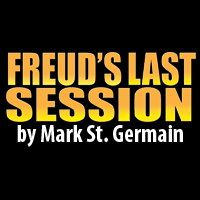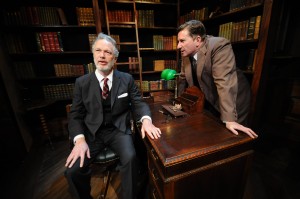

Is it a drama or a debate? In conflict regarding the existence of God, Sigmund Freud and C. S. Lewis engage in both. It’s 1939. Hitler’s planes are flying to bomb London. Freud, facing death from oral cancer and thinking Lewis will succeed him as intellectual giant and influence, invites him to change his mind.
Ostensibly, the basic argument pits Science against Religion. What really occurs is a clash between two methods of reasoning: scientific (induction) against philosophical (deduction) to reach truth. And Mark St. Germain, locating these methods in real characters engaging in speculation, shows that scholarship and intellectual pursuit can be dramatic, even exciting. Especially when the debaters pursue the same important subjects: the existence of God and the meaning of human life.
Each actor catches well the essential style of his debater. George Tynan Crowley’s self-important, older Freud, speaks and acts authoritatively. He’s quite witty even in pain, which sometimes makes him less audible. He often uses humor to deprecate God as well as people (mainly Jews and Christians) and institutions (particularly the Roman Catholic Church) that promote the “fantasy” of faith. Freud regards sex as the “fount” of all human pleasure and touches off anxiety in Lewis when he speaks of committing suicide.
Jeffrey Plunkett delivers Lewis with warmth and joy (one of the reasons he gives for a God who endows men with same), except when he hears Freud contemplate killing himself. Emotional Lewis, who has the enthusiasm of a convert, can’t abide negativity. Though he understands science, he prefers to enjoy literature, philosophy, theology, music. His personality is more sparkling, even if not buoyed as much by humor as is Freud’s.
Director Kate Alexander follows author St. Germain’s lead in not tipping the play’s argument in favor of either debater. She positions her actors very well in differing scenes, not at all an easy task during a painful attack Freud suffers. She also shows two actions that show kinship between him and Lewis: In argumentation, both come to and leave the important question of suffering undetermined and, when they hear an attack warning, each of the two survivors of war grabs for a gas mask.
Isabel & Moriah Curley-Clay’s re-creation of Freud’s office in London, itself that of his former office in Vienna, is distinctive and well-lit by Robert Perry. Does it surprise that Freud collected there an abundance of figures of gods? His couch fits into its surroundings both really and symbolically.
Characterizing clothes are of Susan Angermann’s design. Thomas Korp’s sound, as of radio broadcasting, comes in appropriately. Audience discussion is held after selected performances, although I doubt anyone will settle Freud and Lewis’ debate.
